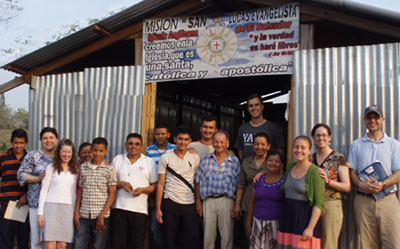[Editor’s note: We invited several YDS students to offer reflections on the theme “What I Did Over Summer Vacation.” Natalie Blasco ’15 M.Div. offered this reflection from the Berkeley trip to El Salvador in May.]
Read more articles from students:
Joel Bergeland: “Good work, no matter how it ends.”
Angel Collie: Rewriting exclusive theological narratives—globally and locally
Jordan Scruggs and Dana Capasso: “No longer invisible”
When I first heard that there was a group of Berkeley Divinity School students interested in travelling to El Salvador during the summer, I immediately expressed interest. My father was an Episcopal priest and, in 1964, he served a small Spanish-speaking congregation in what was then known as The Episcopal Church’s Missionary District of Central America. He was the first Spanish-speaking Episcopal priest in El Salvador and the first to offer services to the Spanish-speaking population in San Salvador. Today, the Episcopal/Anglican Diocese of El Salvador is growing by leaps and bounds under the leadership of its bishop, The Rt. Rev. Martin Barahona. This wasn’t just a learning opportunity for me; this was my chance to connect with my father once more, almost exactly ten years after his passing.

Natalie Blasco, second from left, together with the students from Berkeley and the lay leaders from the San Lucas Mission. |
On May 8th, just one day after final exams, six tired but excited BDS students, including myself, boarded a plane to El Salvador on a trip that would change our concept of how to BE church. For a few years now, BDS has been fostering a sister relationship with the Diocese of El Salvador and its bishop. This is the second summer that students have visited that diocese to learn more about the Hispanic Episcopal Church outside of the USA in order to better serve the Hispanic population here in the states.
During our week in El Salvador, we visited the missions of St. Lucas and El Maizal, as well as two diocesan school communities. We also attended classes at the diocesan school and tagged along with a medical team consisting of a doctor, nurse, and dentist on their visit to yet another mission. At St. Lucas and El Maizal, we had the opportunity to interview clergy as well as lay leaders of the community.
We learned that the Church in El Salvador is intentional when developing missions. They not only tend to the spiritual needs of the communities served but they are also very much aware that, in poor countries such as El Salvador, spirituality takes a second place to basic human needs. If a mission is established, the initiative must be taken by the community itself and only then is a priest or deacon called in to serve. Within each mission, along with a place for worship, the diocese also establishes a clinic, a school, and housing for those who are in need. These services come with a huge responsibility for those who are being served, not to the church but to the community itself.
The Diocese of El Salvador knows full well that a church is not the priest or the building, but a place where two or more are gathered in Jesus name (Matthew 18:20). On this short visit, we learned what it is to be the true church. In our own churches, we find ourselves worrying about the upkeep of church buildings, of endowments, and about hiring the perfect priest when all we really need to do is to take responsibility for our brothers and sisters here, in El Salvador and everywhere. We are the church of God and we are responsible for one another.
| Attachment | Size |
|---|---|
| 4.56 KB |